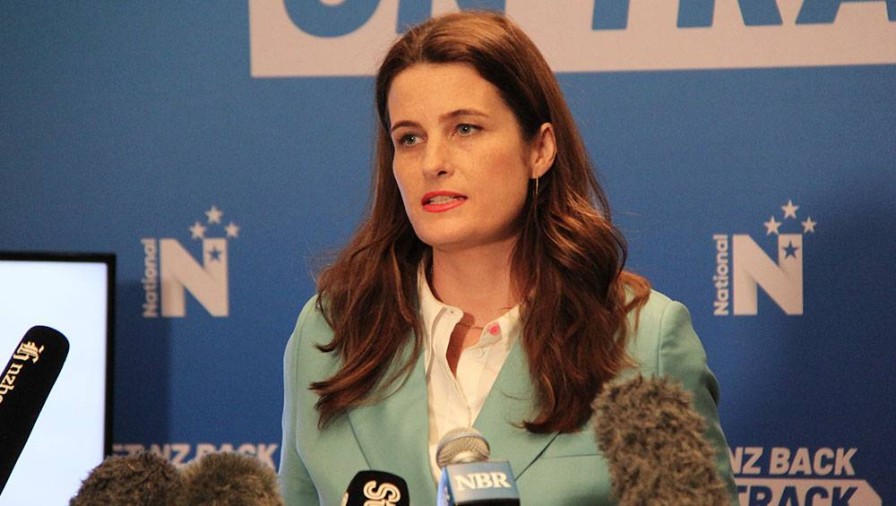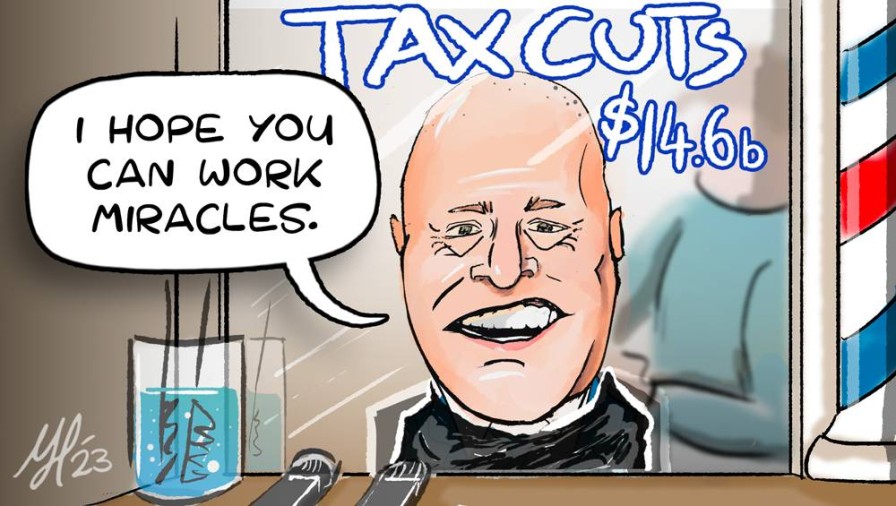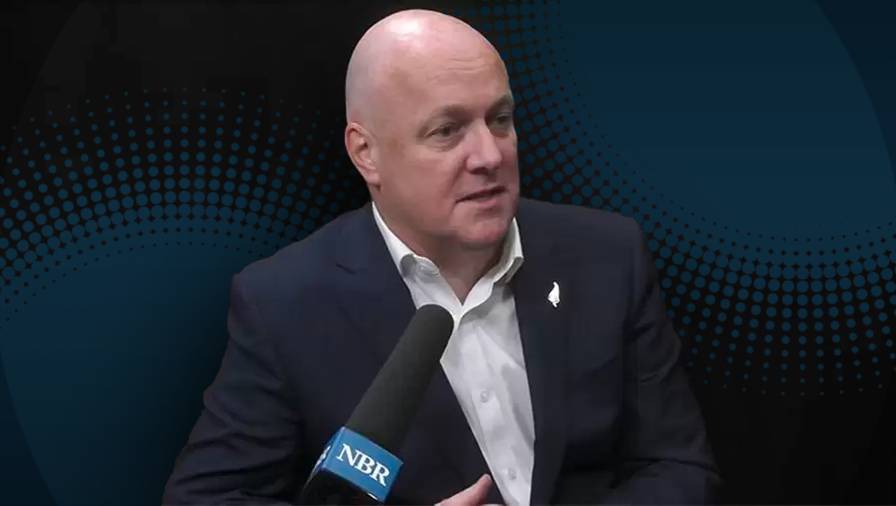Tax cuts, disability funding, Chinese hacks, New Zealand First
ANALYSIS: The Government remains committed to tax cuts despite a worsening economic and fiscal outlook.
Beehive Banter
ANALYSIS: The Government remains committed to tax cuts despite a worsening economic and fiscal outlook.
Beehive Banter
Finance Minister Nicola Willis was adamant when she delivered her Budget Policy Statement this week that tax cuts would remain the centrepiece of the May 30 Budget.
No-one expected Willis to spill the details – although plenty of reporters asked – because the statements set out the large parameters of a government’s fiscal plan. The details will be in the Budget.
What is surprising though is the fact that Willis could not put a number on just how much would be set aside for new spending, the operating allowance, as previous finance ministers have done. Apparently the Cabinet has not worked that out yet, but it will be less than the $3.5 billion the previous Labour Government had inserted into last year’s Budget.
Predictably there is much criticism of the statement and its lack of even a headline figure for new spending. Willis continues to face criticism over the Government’s unabashed commitment to tax cuts in the face of a worsening economic and fiscal situation, which makes affording them at this time even more difficult.
Even the New Zealand Initiative’s Dr Oliver Hartwich argues there are good reasons to cancel the promised tax cuts, prompting a tiff with the Taxpayers’ Union on social media platform X. The Taxpayers’ Union said only an economist could argue that a cost-of-living crisis was not the time to let struggling households keep more of their money.
“We have huge respect for Oliver, but he is wrong on this one,” the union said.
“I have huge respect for the Taxpayers’ Union, but it would be good if they hired a few economists,” Hartwich retorted.

Finance Minister Nicola Willis.
It does seem the coalition Government – or more specifically the National Party – is caught by its political promise to deliver tax cuts. Even as Willis promises tax cuts she is telling reporters the fiscal situation is much worse than expected and that the Budget surplus is now another year away in 2027-28. Even then, while it is achievable in that year, it is “not a given,” she says.
Surely a government intent on getting the books back into order might delay tax cuts until at least a surplus is a “given”.
The Government’s reiteration of its commitment to tax cuts comes after Labour Party leader Chris Hipkins had earlier in the week confirmed his party would review its tax policy and that everything was back on the table, including a comprehensive capital gains tax.
On the day of the Budget Policy Statement, legislation restoring interest deductibility for landlords, reducing the bright-line test to two years, removing depreciation deductions for commercial and industrial buildings, and imposing a gaming duty on offshore online casino operators also passed its third reading.
Willis says removing depreciation deductions for commercial and industrial buildings will save $2.31b over the next four years.
But restoring interest deductibility for landlords will cost about $2.9b and the gaming duty for offshore online casino operators is only going to raise a pittance in comparison with what National had calculated before the election.
Despite that, though, Willis is confident the Government can proceed with tax cuts in a fiscally neutral way, which will be paid for by cost saving, reprioritisations, and other revenue initiatives. The details will be in the Budget.

The Government says it can still deliver tax cuts in a fiscally neutral way.
The Government continued to be dogged by controversy over its botched handling last week of effective cuts to funding for disabled people’s equipment and respite care. Disability Issues Minister Penny Simmonds has acknowledged the matter was not communicated well.
In response, Willis told reporters this week that future decisions on funding by the Ministry for Disabled People would have to go to Cabinet to be signed off.
Prime Minister Christopher Luxon confirmed that, saying any serious major change to frontline services had to go to the Cabinet.
“In this case, it didn’t. It was poorly consulted and poorly communicated, and it’s right that she [Simmonds] apologises for it, as did the ministry,” Luxon said.
But RNZ reported the Prime Minister still defended Simmons, saying she was doing a great job.
Labour’s Hipkins doesn’t think so though and says Luxon has now taken disability funding out of Simmonds’ hands in a clear demonstration he has no faith in her.
“It is an extraordinary step and a massive vote of no confidence for Cabinet to intervene because a minister is failing to make decisions in her own portfolio. Christopher Luxon should remove her as minister altogether,” Hipkins says.

Prime Minister Christopher Luxon.
One thing all parties appear to agree on are the concerns raised by revelations that the Chinese hacked into the Parliamentary Service and Parliamentary Counsel’s website in 2021. That revelation was made as part of a broader series of accusations about Chinese hacking from the United Kingdom and the United States.
In the face of Chinese denials, the Government Communications Security Bureau director-general Andrew Clark says there has been a forensic examination of the hacking to give the agency the confidence to name China as being responsible.
It is convenient the accusations were not raised last week when Chinese Foreign Minister Wang Yi was in Wellington.
It appears there had been discussion among British, American, and New Zealand authorities for some weeks about the timing of the announcement. New Zealand had little choice but to go along with it, given the British were apparently going to name New Zealand as a target of the cyber-attacks anyway.
Just what it does to New Zealand’s relationship with its largest trading partner remains to be seen, but more likely it might simply be a bump in the road. And, should anyone be surprised or unnecessarily alarmed at China’s activities?
After all, what does the GCSB do? On its website it is relatively clear: “Our legislation enables us to intercept communications, seek assistance from telecommunications network operators and service providers, and receive intelligence from our international partners. It also allows us to access information infrastructures, which is more than just interception. Accessing information infrastructures also allows us to retrieve digital information directly from where it is stored or processed,” it says.
Sounds awfully like hacking.

Relations with China might be a bit cooler for a while after New Zealand accused it of hacking.
Talking of secrets, the Court of Appeal has rejected an appeal by the Serious Fraud Office against the High Court decision in the case involving the New Zealand First Foundation. It means the names of the two men charged with offences will never be publicly known.
The decision prompted another outburst from New Zealand First leader Winston Peters, who accused the SFO and the Electoral Commission, which had referred the matter on, of being involved in malicious attacks against his party.
“These were nothing but malicious unfounded attacks by the SFO, Electoral Commission, and especially some in the media with blatant personal vendettas. We want an apology,” Peters said.
But the SFO was not about to apologise, noting that the Court of Appeal had concluded $750,000 held by the New Zealand First Foundation were party donations and that it “left undisturbed” the High Court’s original conclusion that the two defendants had engaged in a “dishonest scheme” and had intentionally and deceptively misled the party about the nature of the donations.
The SFO’s statement said despite finding the respondents had acted dishonestly, the Court of Appeal held that the Crown was not in a position to argue an error of law on this point.

Karen Chang.
SFO director Karen Chang said the findings reinforced the importance of taking the original case and of appealing the High Court decision.
“Transparency is key to a well-functioning democracy. New Zealanders have a right to know who is funding our political parties, and this right should not be as easily circumvented as through depositing funds into a trust,” Chang said.
Peters might be waiting some time for an apology.
Brent Edwards is NBR’s political editor.